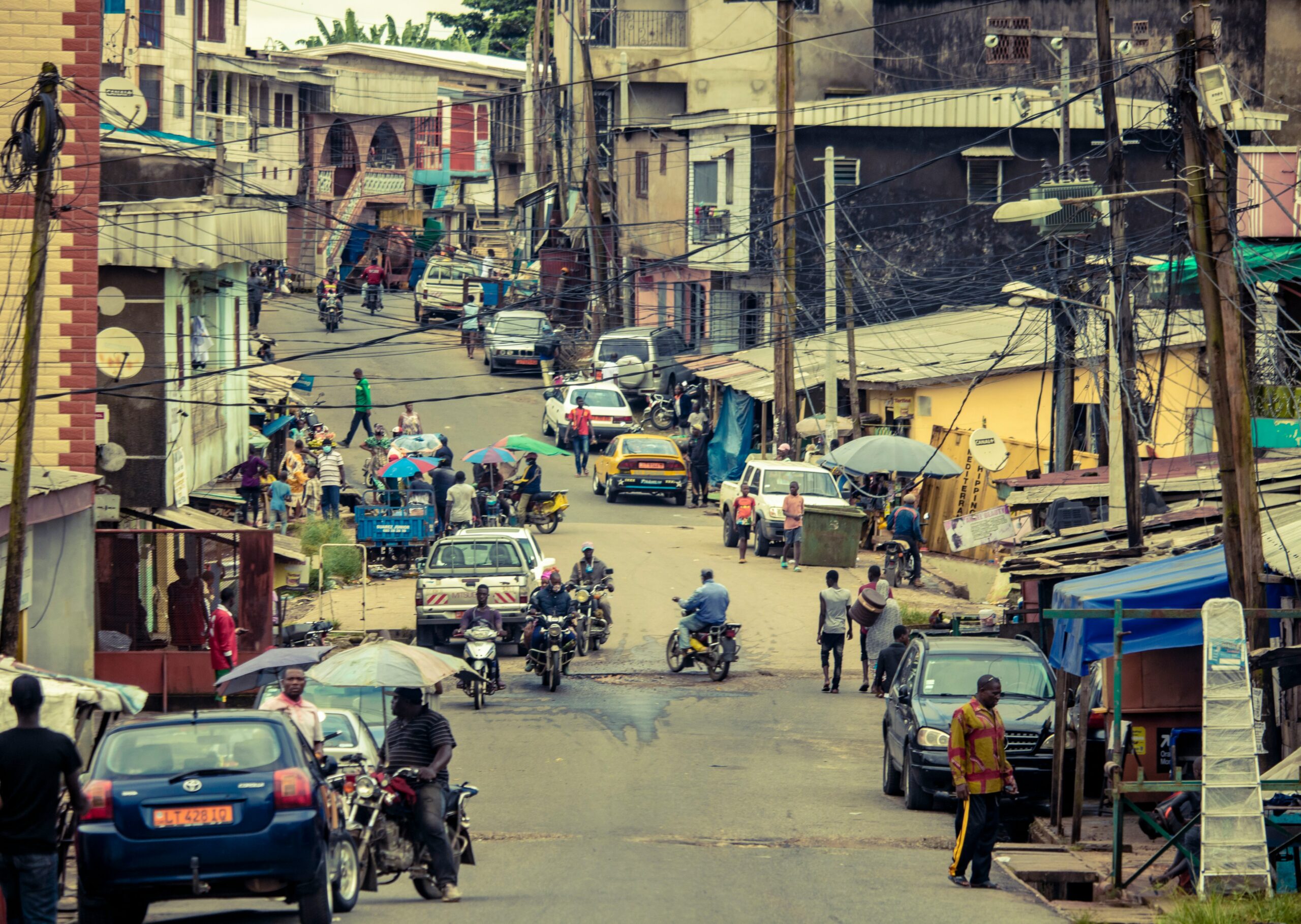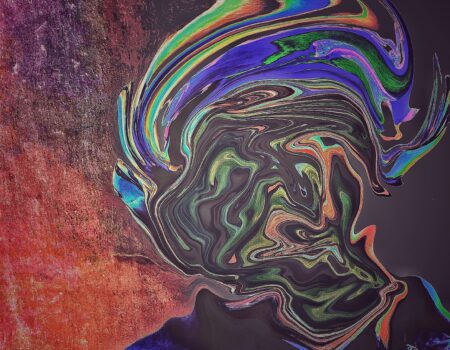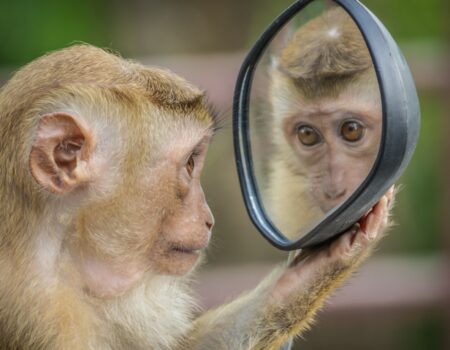Last night you went to the club with Bisi. It was only your second time of going. You still felt like a fish thrust into an ocean after a lifetime accustomed to swimming in a barrel. The smell of beer, smoke from cigarettes and igbo, and bodies that told stories of a long day wafted from every corner. The flashing red, blue, and green lights played a mad-dance routine with the music booming from the speakers. Bisi pulled you along till you were lost in a throng of bodies, your mind reeling, struggling to process so many smells and sights in so short a time. You saw the yahoo boys, the policemen and area boys form an unholy trinity, as they kissed one another, passing wrapped, lit joints around their table. You saw Niniola, the girl who ran a salon near your house, with the big-bellied, local politician, his hands stroking her thighs, a contented look on his face. At your table sat Bisi, her fingers curled around her second bottle of Star while you struggled to finish your first. The sour taste of the beer and the smoke in the air made you dizzy. Guys and girls came to chat with Bisi and they paid you no mind. It didn’t matter to you. You didn’t know what you would have said to them anyway. Like you, their bodies swelled with the firmness of youth, yet, their fancy wigs and chunky jewellery made you feel worlds apart from them.
You watched Bisi dance, shrieking with laughter as men twirled her on the dance floor. When you got up to go outside for some air, strong arms pulled you into a smoke-smelling embrace, and hips thrust into yours from behind. You screamed, but no one could have heard you. You wriggled away, went out, and found your way home. Bisi never noticed you leave.
You were a passenger in many nights in Isale-Eko. The nights came with loud music from the bar, soliciting prostitutes down on the corner, drunken laughter from plastered fellows as they staggered past your window, constant slaps of sweaty flesh in an erotic dance, moans of your mother, and groans from whichever man found solace between her legs that night, peppered by the sound of gunshots – no doubt from the young hell-raisers who spent their days hassling passers-by and raping young women – the hoots of young truants at the sleazy arcade, furtive exchanges of igbo and Naira notes in dark corners, and the roar of the night watchman’s locally-made gun. You hated the nights. They seemed like God’s punishment for a sin you had no hand in, for an offence you were born into. You imagined the rich on the other side of the Island in their fancy houses in those streets with cool names. You imagined those streets – blessed with smooth roads – a far cry from yours, lined with potholes and muddy puddles so deep they threatened to swallow you and suck you down into hell. They had a television to watch, not a black and white TV that only showed two channels. You imagined the taps spurting forth clean water in their homes, unlike the muddy water your well provided. They had proper meals to eat, not cold remnants from a half-eaten breakfast. The roofs of their house didn’t creak with strong winds or drip water when it rained.
Your days weren’t much different. You grew up with the sights of heaps of trash overflowing the gutters, rickety danfos with their engines coughing as they drove past, ice-cream sellers hooting their horns, policemen in search of miscreants, gamblers hanging at the doorways of 1960 shops, public spats of angry lovers, and the sight of King’s College boys swaggering past in their flaming white blazers. You had lived with your mother for the past four years. Your father wasn’t around much. The few times he was around brought rare, happy trips to Sandgrouse Market with your mother. The ride in his jalopy with its engine that spluttered all the way to the market, the Lagos heat, and the smell of garri, smoked fish, and spices in the air all made you happy. Even though you ended up with feet bruised from stamps from impatient shoppers, a face bathed in saliva from overzealous haggling by your mother, and sore arms from pushing your father’s rickety Volvo to life, it was one of the best memories of your life devoid of happiness. Sadly, such joy was few and far between due to both the poverty that enveloped your family like fog and the randomness of his presence, like the erratic movement of the clouds of smoke that curled from his ramshackle car.
You remember he was fond of holding one conversation too many with Mama Sarah, much to your mother’s anger. Her presence was a bane that was the cause of many of your parents’ nightly squabbles. You remembered Mama Sarah as a woman who had an apparent abhorrence of bras. Every morning as you fetched muddy water from the shallow well in your face-me-I-face-you apartment, she strutted about, her nose sniffing the air for some early morning gossip. Her thick nipples jutted out and made sharp imprints through her thin spaghetti top, like the ends of torpedoes waiting to ignite. Your father grabbed onto those torpedoes and launched into a non-existent future with her. You never saw him again. Your mother never recovered from his betrayal. The sting of his exit forced her from man to man in a futile search for affection and comfort. If what was between her legs wasn’t enough to keep your father, it could at least pay your school fees when proceeds from her little buka could not. It also paid the rent of the crumbling shack you lived in. The men came in all forms. They were an assortment, similar to the slices of shaki, edo, and roundabout in her watery stew. It was either your mother loved variety, or she was smart enough to know that the welcoming presence of money was more important than its bearer. There was the pot-bellied, local politician whose bushy beards couldn’t mask his quivering jowls. There was Mr Adejobi, your primary school headmaster, who also came to give her lessons you missed out on; the pastor of the rundown church at the end of the street, who after thumping on his Bible all day, came to thump away on your mother all night for a taste of heaven; Sodiq, the carpenter, whose crotch always looked like he tucked his hammer down the front of his faded, ratty jeans. You wondered how that thing fit in her, whether he pounded it in or he eased it in like a chisel through a resistless piece of plywood. Occasionally, there was also the limping Mallam Nuru, bald as a walnut, who owned a kiosk on the corner, and Bayo, one-eyed yahoo boy, who always reeked of gin, his glossy bracelets jingling and chasing one another on his wrists.
Sometimes you thought your mother was no different from the girls on the streets, but when you saw the slim wads of cash the men pushed into her hands, you knew hunger would be caged away for an all too brief period. The skies were a little bluer. But they were a sham. They never lasted. The grey clouds returned with a vengeance. Transient tastes of comfort were worse than no taste at all. It left you craving more.
Hunger was something that was as natural to you as traffic on Third Mainland Bridge. Your body told no stories of hunger. Whatever weight some parts of you lost, your hormones placed in more welcoming places. Your buttocks stuck out proudly, twin mountain peaks on your heavy thighs. Bisi liked complimenting them. Though she was nearly ten years older than you, her body could have taken lessons in femininity from yours. Your mother didn’t like you hanging out with her. She thought she was a runs girl lacking manners; with too many oyinbo clothes that exposed too much of her body. You thought your mother, like the other women, was simply jealous that Bisi’s body was a reminder of their lost youth and their fading beauty that could no longer earn them the favours they once got at the drop of a hat. Bisi intrigued you. You liked her. Her flat seemed to have the comfort and niceties that your squalor-infested existence deprived you. She was only a few years older than you, yet she had a freedom and an air of one living her life on her own terms. You spent more and more time with her. She gradually made you feel less of a passenger in the mystery life you wanted a ride on. You were a lost part of her she’d once left behind years ago, while you saw her as a woman with a life better than yours.
When you went to the club again with her, you tried not to flinch when the men made ribald comments about slobbering over your youthful breasts, and their ordinary conversations that were spiced with needless profanities. You also tried to steel yourself against the smell of smoke that invaded your nostrils and sat in your lungs. When Sodiq grabbed your waist and thrust his groin against your heavy buttocks, you welcomed him. You felt his harsh breath in your ears and the strength of his arms. When he put his lips on yours, you tasted tom-tom, stale beer, and cigarettes. Your heart pounded in rhythm to the music at an unearthing of bodily desires that spewed all over your insides like a geyser. You squeezed your thighs together, and your nipples tightened beneath the flimsy top you borrowed from Bisi. You danced away with many men that night till you lost count. They bought you drinks, pinched your breasts, and made you feel desired. The girl in you died that night, reborn as a woman – a woman hankering for a taste of adventure.
You didn’t need Bisi to go with you to the club anymore. You learnt you could get flirt with, and squeeze money out of the young men with scarred faces who loitered beneath Obalende Bridge, cigarettes between their lips, their muscular arms hanging out of fake, flamboyant basketball jerseys that housed their stocky bodies. You discovered that the yahoo boys liked a body like yours, and could provide you with cheap trinkets in exchange for the treasure you handed out so freely and easily, like an evangelist handing out tracts.
You never went to school so much anymore. The boys either skipped school for the arcade, or went to hang out with the hell-raisers, while the girls seemed like they took turns getting pregnant. Every term, there was a girl who dropped out of school. When you were in JSS3, it was Biola. You just heard she wouldn’t be coming to school anymore. She took up working at her mother’s point-and-kill joint down the road. After a while, you never saw her again. Less than a year later, it was Victoria. In between, you stayed home for a while because your mother couldn’t afford your school fees. You learnt three more girls dropped out while you kicked your heels at home. Only the whispers regarding the failed abortion that led to Lolu’s death three weeks ago pieced the mystery together for you. She was a baby carrying a baby.
Soon, you joined the girls who lurked in the dark streets of Obalende, where they were silhouetted by lights from ATMs. The weak street lights showed the make-up slathered on their faces, curves adorning tight blouses, and legs spilling out of miniskirts that promised much more. You tried to get out of the chain of lack that held you in its vice. You spent many nights on your back, legs pointing at the ceiling like your mother with lifted hands at vigils.
You believed you lived a life better than your mother. But your daily realities told you of your entrapment. The stench of poverty and the absence of comfort your life presented before you gazed at you with a familiar countenance. You struggled against it. You did so in every of your passing actions. You had fights with your mother. She called you a cheap runs girl.
You sneered at her. “Sorry o, madam wey cost. Wetin concern you?”
Her jaw opened wider than that of a hippopotamus. She had no reply. Yet, in her eyes, you saw the stare of one who came upon a stranger. That girl she knew had died, replaced by one changed by the hard embrace of neglect.
When you told Bisi, her shoulders shook with laughter. “See as she dey, she be like old palm wine wey nobody wan drink. All her breasts don fall finish. No man wan touch her.”
You remembered your mother’s powerlessness in the face of the stolen joys of your childhood – a childhood filled with the lack and even worse, hopelessness of a future away from a shack with a leaky roof, alongside faded and patched clothing. You hated her. You hated that she couldn’t keep your fleeting childhood joys from being crushed under the heavy boulder of lack and hopelessness that was emblematic of your daily existence. You remembered your childhood playing ten-ten in the streets, with Lolu and Biola, who were now dead after botched abortions from quacks. You remembered the sharp sting of humiliation on the days you had to beg for meals from neighbours, and their grating laughter that cut you deep. Days like that made the brief childhood joys you enjoyed disappear quickly, like a drop of blood in the ocean. You remembered the mosquitoes that played tunes in your ears while you tried to sleep, and how you had no choice, but to share the pit latrine in your face-me-I-face-you shack that carried more diseases than a hospital could treat. You recalled the times you went hungry to school, and how your friends who fared slightly better than you bought you some gala and ice-cream at break time. You remembered when your mother couldn’t protect you from being raped when you were sixteen. She was asleep in sexual torpor when one of her many partners forced himself on you. In the dark, you couldn’t tell which one of them it was. You forgot neither the cold grip of fright that bound you, nor the hand pressed down on your mouth, muffling your screams of fear and pain. You remembered the stickiness of your blood between your thighs. You also never forgot the sense of worthlessness that sat like an elephant on your chest, an evil complement to the feeling of vulnerability that grew in you like a diseased plant.
You would chart a new course without her. She was aging, her lovers now fancied you more. You gleefully rubbed it in her face. You had made enough money to live alone. You and Bisi made a killing on the streets of Obalende. It was thrilling. You spent your days as a receptionist in a run-down, seedy hotel in Idumota and your nights either dancing away at clubs, or hanging out beneath streetlights, cavorting with men who could afford you. Your eyes had gotten clouded with a hardness that only came from living with one’s nose to the grindstone. You had neither the inclination nor desire for a relationship. You wanted men only for the scent of money they carried. You threw in with Chuks. You knew Chuks could have meant a hundred different names, but you didn’t care. He was rolling in the cash as fast as he could scam people, and you were spending it as quickly as he pushed it into your ready hands. He had a wife and a son he ran out on, in a bid to explore the dregs of his youth before his hairline took a few steps back and he couldn’t go six rounds without his heart feeling like an overblown balloon on the brink of popping. That didn’t stop your trysts with other men. Neither did it lessen the time you spent in clubs.
Chuks vented his displeasure on your beautiful body. You turned up with puffy eyes on some days and stitches on others. On other days he beat you so badly, you bit your tongue in pain till it bled. You tried not to care about it. Your miserable childhood left you cotton-thirsty for money, and you would bear whatever came on the path to drink from the fountain of wealth. Telling you not to use your body as an escapist formula would have been like telling a bullied kid with superpowers to deny their abilities. Yet, as you took bits from life, it clawed swathes of you in return. You didn’t find happiness like you thought you would. You couldn’t ward off the feeling of something being used and discarded. You had way too many scars and too few joys. Your mother was dying of an undiagnosed illness. Chuks left you. You thought you had hit it big with him, but he left you with little more than a bruised body, a wounded heart, and an unappeased lust for wealth. It was ironic that your search for comfort left you with more hurts than you cared to find. You had no relationship with your mother anymore and your heart burned for affection. You tried not to show it though. You still clubbed. You partied. You still prowled the streets of Obalende.
Sometimes there were police raids. In their black outfits, they came, like demons in the night, clubbing the back of your knees and hauling you in the back of their van. In the station where you spent the night, the bleak looks you saw on the faces of your fellow girls reminded you of a scared little girl not too long ago, angry at a mother she now despised, a mother she severed ties with in a bid to seek her place in the world, not one chosen for her. A mother she resembled with each passing day. You shook off the feeling when you stepped out of the foul cell in the mornings. The more you spent time in cells or bouncing from man to man like a kid on a trampoline, the more that feeling weighed on you.
Bisi was aging. She got married. She stayed away from the streets long enough to snag a rich industrialist. It sounded beautiful, except she found herself the fifth in a procession of wives. Without saying, you knew she’d taken that path to avoid being like your mother. Old palm wine wey nobody wan drink. The pain sawed through you. It hurt you in a place you didn’t know you still had. You felt betrayed. You cut off contact with her. You felt lost, alone. Your adventure had careened off a pleasant road and into a path you struggled to recognise.
You turned to drugs. Your lips, already scarred from Chuks’ fists, gradually blackened with each puff you took. Your eyes took on the yellowish tinge of a pothead. You lost weight. It gave you a sickly look. Your mother died. You tried to find comfort in the arms of different men. After Chuks came Ayo. Then it was Francis. Different men, and yet, more of the same – the thrill of meeting someone new, the stupefying sex that turned your legs to liquid butter, the fuzzy feeling that came with having someone to face the world with, and the bitter tears that flowed from your eyes when it all came crashing down. It was more of the same. Perhaps you were meant to spend your life scampering about for what eluded you from your childhood. The juncture between your mother’s legs couldn’t keep the men that trotted into her life; neither could it do the same for you. You ended up with the same figures your mother rolled in the game of dice against fate.
You’re now almost thirty. The sun is fast setting on your youth. When you were younger, that girl who went to the clubs with Bisi saw a lighthouse shining from the boisterous waves that rocked her young life. Now, you see no lighthouse. The waves are battering you hopeless.
You’re still hanging on though. Barely hanging on.
Adédoyin Àjàyí
Adédoyin Àjàyí is a young Nigerian writer. He writes from Lagos, the city that never sleeps. Nature is the biggest influence on his writing. His work has appeared in Brittle Paper, Kalahari Review, Afrocritik, Livina Press, Nantygreens, Literary Yard, Fiction Niche, Literally Stories, Maudlin House, African Writer, Ngiga Review, Spillwords Press, Arts Lounge, and Figwort Literary Journal. His writing explores the intricacies of human relationships. He's addicted to cakes, books, and suits. He tweets @AjayiAdedoyin14.





